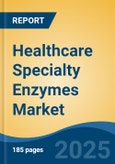Animals is the fastest growing segment, North America is the largest regional market
Speak directly to the analyst to clarify any post sales queries you may have.
10% Free customizationThis report comes with 10% free customization, enabling you to add data that meets your specific business needs.
Key Market Drivers
The rising prevalence of chronic and infectious diseases significantly propels the Global Healthcare Specialty Enzymes Market by increasing the necessity for advanced diagnostic tools and therapeutic interventions. Enzymes are fundamental in the accurate detection and effective management of a broad spectrum of conditions, from metabolic disorders to infectious outbreaks. For instance, diagnostic enzymes are crucial in biomarker detection for early disease identification, while therapeutic enzymes offer targeted approaches for disease treatment, particularly in areas like oncology and genetic disorders.Key Market Challenges
High research and development costs associated with novel enzyme discovery and optimization, coupled with stringent regulatory approval processes for therapeutic enzymes, present substantial impediments to the expansion of the Global Healthcare Specialty Enzymes Market. These financial burdens limit the ability of companies, particularly smaller entities, to invest in innovative enzyme engineering and bioprocessing research. The extended timelines and significant capital required for preclinical and clinical development, alongside high attrition rates, diminish investment appeal and delay market entry for promising new enzyme applications.Key Market Trends
Advancements in enzyme engineering for enhanced performance represent a critical driver for the Global Healthcare Specialty Enzymes Market, fostering the development of enzymes with superior catalytic activity, stability, and specificity required for complex medical applications. This trend involves optimizing enzyme structures and functions through various biotechnological methods, leading to more robust and efficient biocatalysts. According to AseBio, in its 2024 report, the biotech sector in Spain invested 1.28 billion euros in research and development during 2023, marking a 5.2% increase over the previous year, demonstrating sustained investment in core biotechnological innovation. This focus on engineering extends to creating enzymes capable of withstanding harsh physiological conditions or demanding manufacturing processes.Key Market Players Profiled:
- Merck KgaA
- Advanced Enzyme Technologies Ltd
- Amano Enzymes, Inc.
- Amicogen Co., Ltd.
- BBI Solutions OEM Limited
- Biotechrabbit GmbH
- Brain Biotech AG
- Cpc Biotech S.R.L.
- EKF Diagnostics Holdings PLC
Report Scope:
In this report, the Global Healthcare Specialty Enzymes Market has been segmented into the following categories:By Product:
- Carbohydrase
- Polymerase and Nuclease
- Protease
- Lipases
- Phosphates
- Others
By Source:
- Microbial
- Plants
- Animals
By Application:
- Infectious diseases
- Diabetes
- Oncology
- Cardiology
- Nephrology
- Others
By Region:
- North America
- Europe
- Asia-Pacific
- South America
- Middle East & Africa
Competitive Landscape
Company Profiles: Detailed analysis of the major companies present in the Global Healthcare Specialty Enzymes Market.Available Customizations:
With the given market data, the publisher offers customizations according to a company's specific needs. The following customization options are available for the report.Company Information
- Detailed analysis and profiling of additional market players (up to five).
This product will be delivered within 1-3 business days.
Table of Contents
Companies Mentioned
The companies profiled in this Healthcare Specialty Enzymes market report include:- Merck KgaA
- Advanced Enzyme Technologies Ltd
- Amano Enzymes, Inc.
- Amicogen Co., Ltd.
- BBI Solutions OEM Limited
- Biotechrabbit GmbH
- Brain Biotech AG
- Cpc Biotech S.R.L.
- EKF Diagnostics Holdings PLC
Table Information
| Report Attribute | Details |
|---|---|
| No. of Pages | 185 |
| Published | November 2025 |
| Forecast Period | 2024 - 2030 |
| Estimated Market Value ( USD | $ 5.32 Billion |
| Forecasted Market Value ( USD | $ 7.94 Billion |
| Compound Annual Growth Rate | 6.9% |
| Regions Covered | Global |
| No. of Companies Mentioned | 10 |









